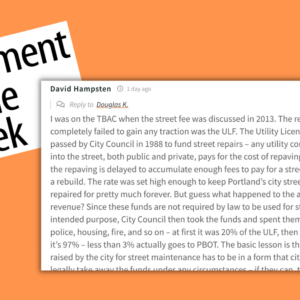Thanks to budget wrangling on Capitol Hill, the threat of federal recissions have reared their ugly head once again. Recissions are when the federal government takes back unspent transportation funds. This time around, it looks like about $2.5 billion is set to go from state coffers back to Washington D.C.
The fear is that when state DOTs decide which funds to send back, they’ll disproportionately grab funds already set aside for biking and walking projects. This threat has caused national biking and walking advocacy groups to send out calls-to-action with messages like, “Your state Department of Transportation is getting ready to take away millions of dollars in pedestrian and bicycle funding” and “Your DOT will likely try to empty out the funds that pay for your sidewalks, bike lanes, trails, and education programs.”
Is Oregon susceptible to such shenanigans? Depends on who you ask.
Back in 2010, the League of American Bicyclists dropped Oregon to fifth place (we were fourth) on their Bicycle Friendly State Rankings. One of the reasons they gave was that we had rescinded, “… quite a bit of the federal money – more than was required by FHWA.”
Number-crunching by America Bikes found that Oregon sent back $20.2 million in unspent federal funds slated for active transportation programs in 2009.
But it’s not quite that black-and-white says ODOT’s Pat Fisher, who holds the federal pursestrings for Oregon’s largest pot of dedicated bike project funds, the Transportation Enhancements (TE) program. As Fisher said previously on BikePortland,
“Recissions are very misundertood… Those dollars are not really accessible dollars… In reality that’s money that’s from clear back in the mid 90s. In order to award the money to some project now… You’d have to argue that another project is going to be delayed because we want to go back and use the old TE money… Theoretically you could, but politically it’s just not going to happen.”
I asked Fisher if we should be concerned with this latest funding threat and she said,
“The rescission currently proposed will not affect any of our existing TE projects or our OTC [Oregon Transportation Commission] -approved funding level out through 2015.”
Those are re-assuring words, but can we trust ODOT on this?
The Bicycle Transportation Alliance is tracking this process to make sure bike money isn’t unfairly targeted. The BTA’s Gerik Kransky wrote via email recently that,
“ODOT seems to be fairly enlightened regarding rescissions. They anticipate federal recissions in advance… This means that our priority programs, like Transportation Enhancements and Flex Funds, are not in any greater danger than any other federally funded ODOT programs. This is good news.”
We’ll let you know if you need to start sending emails into ODOT. But at this point, it seems like we’re in the clear.







Thanks for reading.
BikePortland has served this community with independent community journalism since 2005. We rely on subscriptions from readers like you to survive. Your financial support is vital in keeping this valuable resource alive and well.
Please subscribe today to strengthen and expand our work.
I’m sure this doesn’t need to be said, but politics are confusing…
I hope there are a lot of good accountants in the political system…
Honest accountants.
A good accountant can skim money off a Ponzi scheme owned by their boss, hide it and retire as the CEO goes to the klink; the honest accountant won’t.
This is a tricky issue. Rescissions target “unobligated balances,” that is, unspent money. Unobligated balances accrue because Congress allows DOTs to spend less than the total that they “apportion” to the state. This is for budgeting reasons that don’t really matter here.
This inevitable gap between the apportioned amount and the amount the DOT is allowed to spend (called the “limitation on obligation” or the “obligation ceiling”) means that some money will never be spent. This is what allows DOTs to say that no projects will be cancelled due to rescissions. They knew they were not going to have the money, so they didn’t commit it to projects.
The problem is that over time DOTs prioritize some funding programs over others. If a DOT spends highway funds first (that is, if they use their limited obligation authority on highway funds) then there is less left for programs that are favorable to bike/ped, like Transportation Enhancements and CMAQ.
In 2009 and 2010, many states had large unobligated balances in TE and CMAQ programs and rescissions hit them hard.
The best way to protect bicycle and pedestrian funds against future rescissions is to ensure that ODOT is making full use of programs like TE and CMAQ.
For more info:
http://www.advocacyadvance.org/site_images/content/Understanding_Rescissions_(2011)1.pdf
http://www.advocacyadvance.org/site_images/content/Rescissions_FAQs.pdf
Is ther a “Rescissions for dummies” page somewhere?
I read through the first quoteblock in the article 3 times and have as many incompatible interpretations.
We’re sending back $2.5 billion to the feds? Really?
Must not be talking about Oregon. People here have to pay for their own sidewaalks